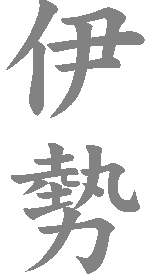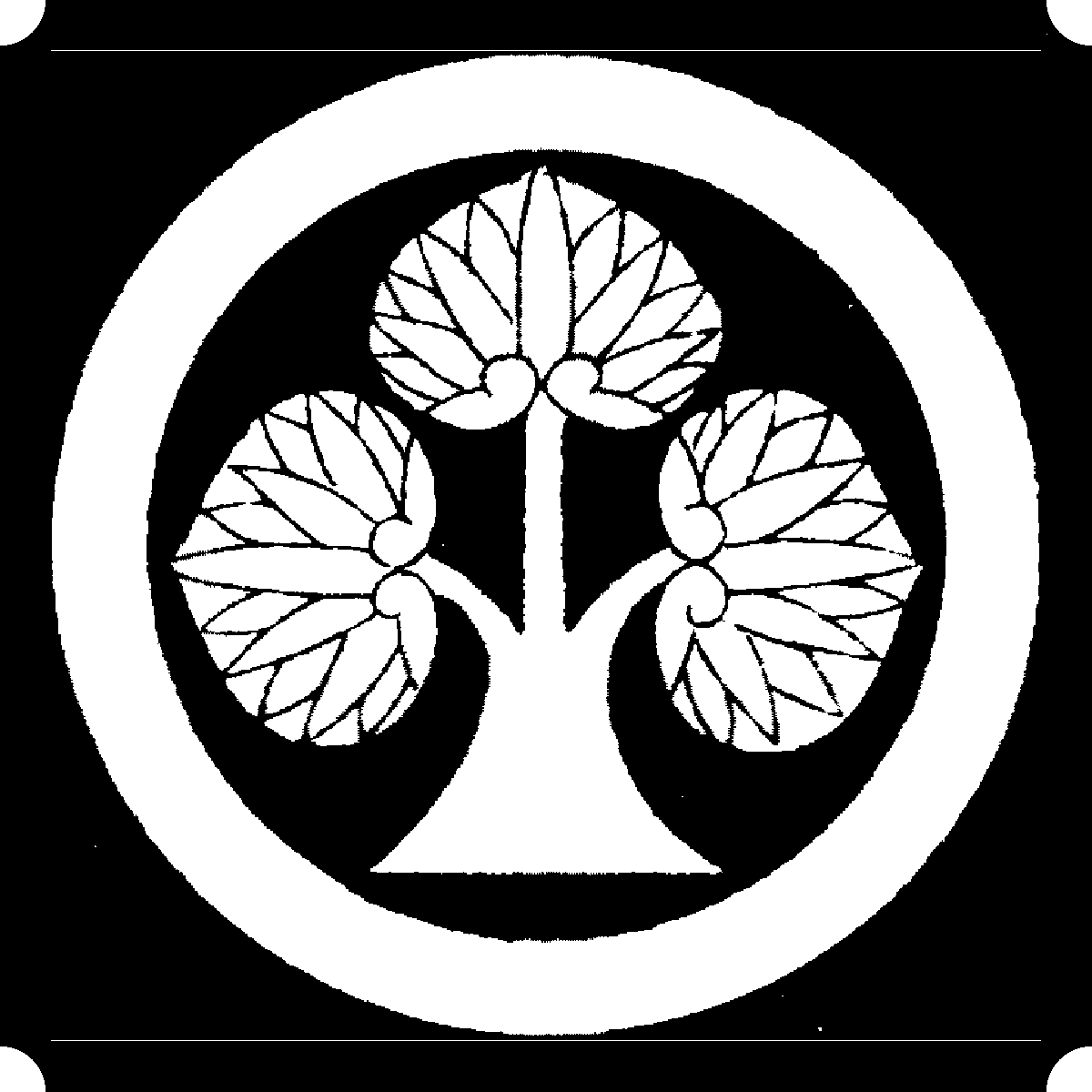|

DAIMYO of
ISE PROVINCE
Todo


- Domain: Tsu
- Stipend: 323,000 koku
- Class: Tozama 4
- Headquarters: Tsu Castle (Flatland)
Daimyo family descended from the kuge Nakahara, descendant of prince
Toneri-shinno (676-735), son of Temmu-tenno.
Succession
- Takatora (1556-1630) - Daimyo of Imabari (Iyo -- 200,000 koku) -- 1st Todo
daimyo of Tsu
- Takatsugu
- Takatora
- Takachika
- Takatoshi
- Takaharu
- Takaaki/Takahora
- Takanaga
- Takasato/Takasado
- Takasawa
- Takayuki (1813-1895, daimyo 1825- )
- Takakiyo - Heir
Notable Ancestors
-
Todo
Takatora (1556-1630)
%20578x600.jpg)
Served Nobunaga, then Hideyoshi, who placed him near his brother Hidenaga.
At the death of the latter in 1591, Takatora shaved his head and retired to the
Koya-san, but Hideyoshi, recalling him, made him counselor of Hidetoshi, heir
to Hidenaga. At the time of the Korean expedition, he commanded a part of the
Japanese fleet. In 1594, Hidetoshi died, and Takatora returned to Koya-san.
Recalled again by Hideyoshi, he received the fief of Osu (Iyo -- 80,000 koku).
After Sekigahara (1600), he was transferred to Uwajima (Iyo -- 200,000 koku);
then in 1608 to Tsu (Ise -- 323,900 koku), where his descendants remained.
Related Branches
- Junior branch: Hisai (Ise -- 53,000 koku)
Sources
Todo


- Domain: Hisai
- Stipend: 53,000 koku
- Class: Tozama 5
- Headquarters: Unknown castle
Daimyo family descended from the kuge Nakahara, descendant of prince
Toneri-shinno (676-735), son of Temmu-tenno.
Junior branch descended from Takamichi, grandson of Takatora, from 1632
resided at Hisai.
Succession
- Takatora (1556-1630) - Daimyo of Imabari (Iyo -- 200,000 koku) -- 1st Todo
daimyo of Tsu
- Takatsugu
- Takamichi - 1st Todo daimyo of Hisai
- Takakata
- Takanobu
- Takaharu
- Takatoyou
- Takamasa
- Takaatsu
- Takaeda
- Takaoki
- Takahira
- Takanao
- Takasawa
- Takatou
- Takayatsu
- Takayori
- Takakuni
Notable Ancestors
-
Todo
Takatora (1556-1630)
%20578x600.jpg)
Served Nobunaga, then Hideyoshi, who placed him near his brother Hidenaga.
At the death of the latter in 1591, Takatora shaved his head and retired to the
Koya-san, but Hideyoshi, recalling him, made him counselor of Hidetoshi, heir
to Hidenaga. At the time of the Korean expedition, he commanded a part of the
Japanese fleet. In 1594, Hidetoshi died, and Takatora returned to Koya-san.
Recalled again by Hideyoshi, he received the fief of Osu (Iyo -- 80,000 koku).
After Sekigahara (1600), he was transferred to Uwajima (Iyo -- 200,000 koku);
then in 1608 to Tsu (Ise -- 323,900 koku), where his descendants remained.
Related Branches
- Senior branch: Tsu (Ise -- 323,000 koku)
Sources
Honda


- Domain: Kanbe
- Stipend: 15,000 koku
- Class: Fudai 5
- Headquaters: Kanbe Castle
Daimyo family native to Mikawa and descended from the Fujiwara.
Younger branch which was first installed at Nishishiro (Kawachi), and since
1732 resided at Kanbe.
Succession
- Tadatsugu (1549-1613)
- Yasutoshi (1570-1622)
- Toshitsugu
- Yasumasa
- Tadamune - 1st Honda daimyo of Kanbe
- Tadanaga
- Tadaoki
- Tadahiro
- Tadataka
- Tadayoshi
- Tadatsura
Notable Ancestors
-
Honda
Tadatsugu (1549-1613)
Inherited the castle of Ina (Mikawa), which his descendants occupied for
several generations.
-
Honda
Yasutoshi (1570-1622)
In 1601 was nominated daimyo by Ieyasu at Nishio (Mikawa); then in 1607
at Zeze (Omi -- 30,000 koku).
His descendants resided: in 1602 at Nishio (Mikawa); in 1636 at Kameyama (Ise);
in 1651 at Zeze (Omi -- 60,000 koku), where they continued to reside.
Related Branches
- Elder branch: Zeze (Omi -- 60,000)
- Youngest branch: Nishibata (Mikawa -- 10,500 koku)
Sources
Matsudaira (Hisamatsu)
  
- Domain: Kuwana
- Stipend: 113,000 koku
- Class: Shinpan 4
- Headquarters: Kuwana Castle
%20800x558.jpg)
%20800x524.jpg)
Family issued from Sadatsuna, 3rd son of Sadakatsu, uterine
brother of Ieyasu.
Succession
- Toshikatsu
- Sadakatsu (1560-1624)
- Sadatsuna (1592-1651) - Daimyo of Shimotsuma (Hitachi -- 30,000 koku);
daimyo of Kakegawa (Totomi -- 30,000 koku); daimyo of Yoko (Yamashiro --
35,000 koku); daimyo of Ogaki (Mino -- 60,000 koku); 1st Matsudaira daimyo
of Kuwana (Ise -- 113,000 koku)
- Sadayoshi
- Sadashige - 3rd Matsudaira daimyo of Kuwana; 1st Matsudaira daimyo of
Takada (Echigo -- 113,000 koku)
- Sadamichi
- Sadateru
- Sadanori
- Sadayoshi - 5th Matsudaira daimyo of Takada; 1st Matsudaira daimyo of
Shirakawa (Mutsu -- 110,000 koku)
- Sadakuni
- Sadanobu (1758-1829)
- Sadanaga - 4th Matsudaira daimyo of Shirakawa; 1st Matsudaira daimyo of Kuwana
- Sadakazu
- Sadamichi
- Sadaaki (1847-1908, daimyo 1859- )
- Sadatsuna - Heir
Notable Ancestors
In a 2nd marriage, he took to wife Dai, the mother of Ieyasu and widow
of Tokugawa Hirotada ( -1549), by whom he had three sons.
-
Matsudaira
Sadakatsu (1560-1624)
Was daimyo of Kakegawa (Totomi), Kuwana (Ise), and Nagashima (Ise). In
1634, his son
Sadayuki was transferred to Matsuyama (Iyo -- 150,000 koku), where his
descendants resided.
-
Matsudaira
Sadatsuna (1592-1651)
3rd son of Sadakatsu and heir to his elder brother Sadayoshi, resided
first at Yamakawa (Shimosa). After the war of Osaka (1615), he was transferred
to Shimotsuma (Hitachi -- 30,000 koku); in 1619 to Kakegawa (Totomi -- 55,000
koku); in 1625 to Yodo (Yamashiro -- 65,000 koku); in 1633 to Ogaki (Mino --
85,000 koku); in 1634 to Kuwana (Ise -- 100,000 koku).
His descendants resided: in 1710 at Takada (Echigo); in 1741 at Shirakawa
(Mutsu).
-
Matsudaira
Sadanobu (1758-1829)
7th son of Tokugawa (Tayasu) Munetaka, was adopted by Matsudaira
Sadakuni and in 1789 succeeded him at Shirakawa. He distinguished himself by a
wise administration and in 1787 was named roju, then hosa of the Shogun
Ienari (1790). He took henceforth a leading part in the government of the
Bafuku, and to him the prosperity of the Kansei era (1789-1801) is usually
attributed. In 1793, Sadanobu opposed the emperor Sukehito-shinno, the title of
Dajo-tenno, although he had never reigned. Several times the Russians
tried to open communications with the Japanese: they were sent to Nagasaki,
where they met always with an evasive answer; moreover, Sadanobu had all the
coasts inspected with care and forts constructed so as to prevent any attempt
at landing. In 1812, he withdrew from office, had his head shaved, and took the
name of Gaku-o. Sadanobu, one of the great ministers of the Shogunate of Edo,
is also known as a writer; he left several works. He is often called Matsudaira
Etchu no kami. In 1823, his son Sadanaga was transferred from Shirakawa to
Kuwana (Ise -- 113,000 koku), where his family resided.
-
Matsudaira
Sadaaki (1847-1908)
.jpg)
%20340x599.jpg)
Took an important part in the defense of the Shogunate.
Related Branches
- Tako (Shimosa -- 12,000 koku)
- Matsuyama (Iyo -- 150,000 koku)
- Imabaru (Iyo -- 35,000 koku)
Sources
Ishikawa


- Domain: Kameyama (aka Ise-Kameyama)
- Stipend: 60,000 koku
- Class: Fudai 5
- Headquarters: Kameyama Castle (Hilltop)
Daimyo family native of Kawachi and descended from Minamoto Yoshitoki, a
son of Yoshiie (Seiwa-Genji).
Senior branch.
Succession
- Kiyokane
- Ienari (1534-1600)
- Yasumichi (1554-1607)
- Tadafusa (1572-1650) - 1st Ishikawa daimyo of Zeze (Omi -- 70,000 koku)
- Noriyuki - 2nd Ishikawa daimyo of Zeze; daimyo of Kameyama (Ise -- 50,000
koku), 1st tenure; 1st Ishikawa daimyo of Yodo (Yamashiro -- 60,000 koku)
- Yoshitaka
- Fusayoshi - 3rd Ishikawa daimyo of Yodo; daimyo of Matsuyama (Bitchu --
60,000); 1st Ishikawa daimyo of Kameyama, 2nd tenure
- Fusataka
- Fusazumi
- Fusahiro
- Fusanori
- Fasasuke
- Fusayasu
- Fusanori
- Fusayoshi
- Fusanobu (unranked)
- Nariyuki
Notable Ancestors
-
Ishikawa
Ienari (1534-1600)
Hyuga no kami, served Ieyasu and accompanied him in all his campaigns
against the Imagawa (1569), the Takeda (1572), etc.
-
Ishikawa
Yasumichi (1554-1607)
Nagato no kami. In 1590 received the Naruto fief (Kozuke -- 20,000 koku) from
Ieyasu. After the battle of Sekigahara (1600), he was transferred to
Ogaki (Mino -- 50,000 koku).
-
Ishikawa
Tadafusa (1572-1650)
Son of Okubo Tadachika, daimyo of Odawara, was adopted by Yasumichi and
succeeded him, but in 1614, implicated in a plot of which Tadachika was accused, he was dispossessed. After the siege of Osaka, he received the
daimyoate
of Hida (Bungo -- 60,000 koku). In 1633 he was transferred to Sakura (Shimosa),
and the following year to Zeze (Omi).
His descendants resided successively: from 1651 to 1669 at Kameyama (Ise); from 1669 to
1711
at Yodo (Yamashiro); from 1711 to 1744 at Matsuyama (Bitchu); and from 1744 at Kameyama
(Ise -- 60,000 koku).
Related Branches
- Junior branch: Shimodate (Hitachi -- 20,000 koku)
Sources
Masuyama (Mashiyama)


- Domain: Nagashima
- Stipend: 20,000 koku
- Class: Fudai 5
- Headquaters: Nagashima Castle
Daimyo family from Shimotsuke, descended from Fujiwara Uona. Made noble in
1647, they resided successively: in 1659 at Nishio (Mikawa -- 20,000 koku);
in 1663 at Shimodate (Hitachi -- 20,000 koku); then from 1702 at Nagashima.
Succession
- Masatoshi - 1st Masuyama daimyo of Nishio (Mikawa -- 20,000 koku)
- Masamitsu - 2nd Masuyama daimyo of Nishio; daimyo of Shimodate (Hitachi --
20,000 koku); 1st Masuyama daimyo of Nagashima
- Masatou
- Masatake
- Masayoshi
- Masakata
- Masayasu
- Masanao
- Masatomo
Sources
Hijikata


- Domain: Komono
- Stipend: 11,000 koku
- Class: Tozama 5
- Headquarters: Municipal office
Family of daimyo native of Owari and descended from the Seiwa-Genji by
Yorichika, a son of Mitsunaga. From 1600 they resided in Komono.
Succession
- Katsuuji
- Katsutaka
- Katsutoyo
- Katsuyoshi
- Katsufusa
- Katsumasa
- Katsunaga
- Katsusada
- Katsutane
- Katsuoki
- Katsuyoshi
- Katsunaga (1851-1884, daimyo 1858-1870)
- Katsuyuki
Sources
|
